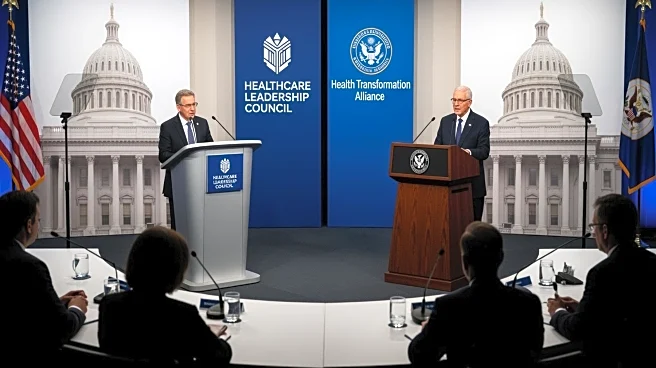What's Happening?
Healthcare stakeholders are actively engaging in discussions to understand the implications of recent regulatory changes under the Trump administration. Maria Ghazal, CEO of the Healthcare Leadership Council,
and Robert Andrews, CEO of the Health Transformation Alliance, have been at the forefront of these conversations. They have been meeting with their members to debrief on significant policies such as President Trump's One Big Beautiful Bill Act and the Most Favored Nation policy. These discussions aim to help stakeholders navigate the evolving healthcare landscape and assess how these policies affect the sector.
Why It's Important?
The regulatory changes introduced by the Trump administration have significant implications for the healthcare industry. Policies like the One Big Beautiful Bill Act and Most Favored Nation could alter pricing structures and access to healthcare services. Stakeholders, including hospitals, practices, and payers, must adapt to these changes to ensure compliance and maintain service delivery. The discussions led by Ghazal and Andrews are crucial for aligning strategies and understanding the broader impact on healthcare operations and patient care. These policies could potentially reshape the healthcare market, affecting costs and accessibility for millions of Americans.
What's Next?
Healthcare stakeholders are expected to continue their analysis and discussions to fully grasp the long-term effects of these policies. As the Trump administration's regulatory changes unfold, organizations may need to adjust their operational strategies and advocacy efforts. Future meetings and collaborations among healthcare leaders will likely focus on developing adaptive strategies and influencing policy decisions. Stakeholders may also engage with policymakers to advocate for adjustments that better align with industry needs and patient welfare.
Beyond the Headlines
The regulatory shifts under the Trump administration highlight the complex interplay between government policy and healthcare delivery. These changes could prompt ethical debates about access to care and the role of government in regulating healthcare costs. Long-term, the industry may see shifts in how healthcare services are priced and delivered, potentially leading to increased innovation in care models and payment structures.












